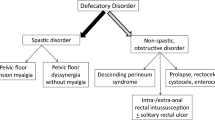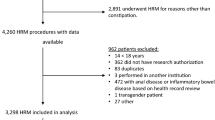Abstract
Background
There is insufficient data from India regarding clinical predictors of dyssynergic defecation.
Aim
To identify demography, symptom, and colonoscopic parameters that can predict dyssynergic defecation (DD) among patients with chronic constipation (CC) and to compare the profile among male and female patients with DD.
Methods
Data collected from three centers during June 2014 to May 2017 included age, gender, symptom duration, form and consistency of stools, digital examination, colonoscopy, and anorectal manometry (ARM). Patients were grouped based on ARM diagnosis: group I (normal study) and group II (DD). The two groups were compared for demography, symptom profile, and colonoscopy findings. Gender-wise subset analysis was done for those with the normal and abnormal ARM using chi-square and unpaired t tests.
Results
Of 236 patients with CC evaluated, 130 (55%) had normal ARM and 106 (45%) had DD. Male sex, straining during defecation, bleeding per rectum, and abnormal colonoscopic diagnosis were significantly more common in group II. While bleeding per rectum and absence of urge to defecate were more common in males (p < 0.02), straining, digital evacuation, and hard stools were commoner in females with DD.
Conclusion
Straining during defecation, bleeding per rectum, and abnormal colonoscopy findings were more common in patients with DD. Symptoms of bleeding per rectum and absence of urge to defecate in men and straining during defecation in female patients were significantly associated with DD. Symptoms differ in males and females with DD.



Similar content being viewed by others
References
Ghoshal UC. Chronic constipation in Rome IV era: the Indian perspective. Indian J Gastroenterol. 2017;36:163–73.
Rao SS, Patcharatrakul T. Diagnosis and treatment of dyssynergic defecation. J Neurogastroenterol Motil. 2016;22:423–35.
Shah N, Baijal R, Kumar P, et al. Clinical and investigative assessment of constipation: a study from a referral center in western India. Indian J Gastroenterol. 2014;33:530–6.
Ratuapli S, Bharucha AE, Harvey D, Zinsmeister AR. Comparison of rectal balloon expulsion test in seated and left lateral positions. Neurogastroenterol Motil. 2013;25:e813–20.
Rao SS, Hatfield R, Soffer E, et al. Manometric tests of anorectal function in healthy adults. Am J Gastroenterol. 1999;94:773–83.
Rao SS. Dyssynergic defecation and biofeedback therapy. Gastroenterol Clin N Am. 2008;37:569–86.
Videlock EJ, Lembo A, Cremonini F. Diagnostic testing for dyssynergic defecation in chronic constipation: meta-analysis. Neurogastroenterol Motil. 2013;25:509–20.
Ghoshal UC, Abraham P, Bhatt C, et al. Epidemiological and clinical profile of irritable bowel syndrome in India: report of the Indian Society of Gastroenterology Task Force. Indian J Gastroenterol. 2008;27:22–8.
Zhao YF, Ma XQ, Wang R, et al. Epidemiology of functional constipation and comparison with constipation-predominant irritable bowel syndrome: the Systematic Investigation of Gastrointestinal Diseases in China (SILC). Aliment Pharmacol Ther. 2011;34:1020–9.
Park JM, Choi MG, Cho YK, et al. Functional gastrointestinal disorders diagnosed by Rome III questionnaire in Korea. J Neurogastroenterol Motil. 2011;17:279–86.
Jain M, Baijal R. Dyssynergic defecation: demographics, symptoms, colonoscopic findings in north Indian patients. Indian J Gastroenterol. 2017;36:435–7.
Rao SS, Tuteja AK, Vellema T, Kempf J, Stessman M. Dyssynergic defecation: demographics, symptoms, stool patterns, and quality of life. J Clin Gastroenterol. 2004;38:680–5.
Ghoshal UC, Verma A, Misra A. Frequency, spectrum, and factors associated with fecal evacuation disorders among patients with chronic constipation referred to a tertiary care center in northern India. Indian J Gastroenterol. 2016;35:83–90.
Panigrahi MK, Kar SK, Singh SP, Ghoshal UC. Defecation frequency and stool form in a coastal eastern Indian population. J Neurogastroenterol Motil. 2013;19:374–80.
Shin A, Camilleri M, Nadeau A, et al. Interpretation of overall colonic transit in defecation disorders in males and females. Neurogastroenterol Motil. 2013;25:502–8.
Jain M. Digital rectal examination—a reliable screening tool for dyssynergic defecation. Indian J Gastroenterol. 2018; 37:176–7.
Tantiphlachiva K, Rao P, Attaluri A, Rao SS. Digital rectal examination is a useful tool for identifying patients with dyssynergia. Clin Gastroenterol Hepatol. 2010;8:955–60.
Author information
Authors and Affiliations
Corresponding author
Ethics declarations
Conflict of interest
MJ, RB, MS, and JV declare that they have no conflict of interest.
Ethics statement
The study was performed in a manner to conform with the Helsinki Declaration of 1975, as revised in 2000 and 2008 concerning human and animal rights, and the authors followed the policy concerning informed consent as shown on Springer.com. The study protocol was approved by the institutional review board and ethics committee.
Rights and permissions
About this article
Cite this article
Jain, M., Baijal, R., Srinivas, M. et al. Clinical predictors and gender-wise variations in dyssynergic defecation disorders. Indian J Gastroenterol 37, 255–260 (2018). https://doi.org/10.1007/s12664-018-0856-7
Received:
Accepted:
Published:
Issue Date:
DOI: https://doi.org/10.1007/s12664-018-0856-7




